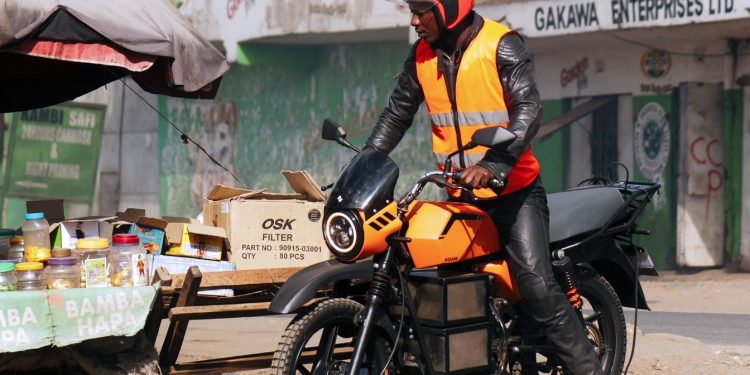Local EVs Delivering Swifter Courier Services in African Cities
African startups are designing and assembling electric vehicles tailored for local delivery needs. From solar-powered cold chains to pharma-compliant vans, these innovations are cutting costs, reducing emissions, and transforming how goods move across the last mile.
Bonface Orucho, bird story agency
Kenya’s Roam has recently partnered with logistics startup Keep It Cool to roll out an electric cold-chain delivery network, signaling rising demand for low-cost, low-emissions transport solutions in food distribution across African cities.
The collaboration combines Roam’s locally assembled electric motorcycles with Keep It Cool’s solar-powered cold storage units. Designed for small traders and retailers in urban and peri-urban areas, the model offers an integrated solution, refrigeration and transport in one system.
According to Elijah Gakomo, a sales executive at Roam, “We’re proving that the future of logistics in Africa is electric, efficient, and built at home.”
“This partnership shows how clean transport can drive real impact, reducing emissions, cutting costs, and strengthening local supply chains.”
Keep It Cool currently serves more than 4,000 vendors and 40 supermarkets across four cities, moving up to 250,000 kilograms of fresh food weekly. The partnership’s first phase integrates five Roam Air motorcycles into the existing cold-chain network.
This latest rollout is part of a broader momentum across the continent, where food delivery platforms and FMCG supply chains are becoming early adopters of electric mobility.
Experts attribute the shift to the operational dynamics of the sector.
“Predictable routes and high trip volumes make the sector particularly suited to electric models that offer lower running costs and minimal downtime,” says Laura Pereira from Stellenbosch University’s Centre for Complex Systems in Transition.
“What we’re seeing is a systems shift in how cities think about movement, energy, and livelihoods. The real opportunity is in designing transport solutions that are contextually relevant, economically viable, and rooted in local ecosystems,” she added.
<script src=”https://bird.africanofilter.org/hits/counter.js” id=”bird-counter” data-counter=”https://bird.africanofilter.org/hits/story/?id=2255&slug=how-locally-built-e-vs-are-powering-africa-s-food-and-pharma-delivery-systems” type=”text/javascript” async=”async”></script>
Roam’s earlier collaboration with grocery platform Greenspoon in 2024 underscored this potential. Greenspoon reports that delivery times were cut from three hours to under 100 minutes, while fuel-related logistics costs dropped by 30%.
Similar dynamics are unfolding across the continent. In Cape Town, Green Riders operates a fleet of around 600 electric bicycles for food delivery services. The company runs on a weekly rental model, mainly supporting migrant workers, who earn an average of US$1.70 per delivery. Rising fuel prices have pushed more platforms to consider alternatives.
Elsewhere, expansion is accelerating. Accra-based Wahu Mobility had deployed over 300 e-bikes by the end of 2024, using a lease-to-own model accessible to couriers and informal traders.
Spiro, the continent’s largest electric two-wheeler operator, now has 18,000 e-bikes across six countries. Riders have completed more than 11 million battery swaps, and the company is scaling up production with new assembly facilities in Kenya and Nigeria.
In Nairobi, cargo e-bike startup eBee supports over 150 vehicles serving clients like Glovo, Jumia, and Bolt Food.
Momentum is also evident in public delivery systems. In Addis Ababa, EV manufacturer Dodai donated 40 electric bikes to the city’s municipal logistics fleet as part of a pilot backed by local authorities.
Also, in Morocco, the national postal service began deploying e-motorcycles in late 2024 and aims to scale to 650 units by mid-2025.
Significantly, the electric shift is expanding beyond two-wheelers. In South Africa, Clicks Group and United Pharmaceutical Distributors (UPD) partnered with Everlectric and Investec Sustainable Solutions to launch the country’s first fleet of electric, pharma-compliant vans equipped with solar-powered refrigeration.
These Maxus eDeliver 3 vehicles are tailored for cold-chain logistics, using onboard solar panels and battery systems to maintain temperature control for up to two days without sunlight.
What’s driving this wave is not just environmental intent but hard economics. Fuel is one of the most volatile cost inputs for delivery firms. Across African cities, operators are increasingly looking to EVs as a hedge against price instability and a path toward lower long-term costs.
Roam estimates that electric motorcycles—when combined with solar charging or battery-swap networks—can reduce operating costs per kilometre by 25% to 40%. Maintenance costs are also lower, given fewer moving parts compared to combustion engines.
A defining feature of the current wave is that the technology is being developed locally.
Roam assembles its bikes in Nairobi with input from delivery riders. Wahu’s units are produced in Accra.
In Rwanda, Ampersand continues to expand its battery-swap platform, now active in both Rwanda and Kenya. Riders can swap batteries in under five minutes, critical for high-frequency logistics.
Government support is beginning to align with these trends. Kenya and Rwanda have waived import duties on electric motorcycles, while city-level projects in Ethiopia and policy frameworks led by UNEP and the African Development Bank are supporting regional EV adoption strategies.
In Kenya, the effects are already visible. The country registered 68,804 new motorcycles in 2024, according to the 2025 Economic Survey by KNBS. Of these, 4,862 were electric—representing 7.1% of all new registrations, based on data from the Electric Mobility Association of Kenya (EMAK).
The Roam–Keep It Cool partnership is especially significant because it brings electric mobility into temperature-sensitive logistics, a segment previously underserved by clean transport innovation.
Industry analysts view last-mile food logistics as a strategic entry point for Africa’s broader electric mobility rollout. The combination of short distances, recurring trips, and digital delivery platforms makes it ideal for scalable EV adoption.
In South Africa, the electric micro-mobility market for last-mile delivery was valued at R244 million (US$13 million) by the end of 2024, with 3,800 electric two- and three-wheelers in use. The segment is projected to grow 20% annually through 2030, adding nearly 18,000 vehicles and reaching R1.2 billion in market value.
“EV-as-a-service leasing models are lowering the entry barrier, allowing independent contractors to access electric mobility affordably, even if upfront costs remain higher than petrol bikes,” says Tom Sawe, a sustainability researcher at the University of Cape Town.
bird story agency








